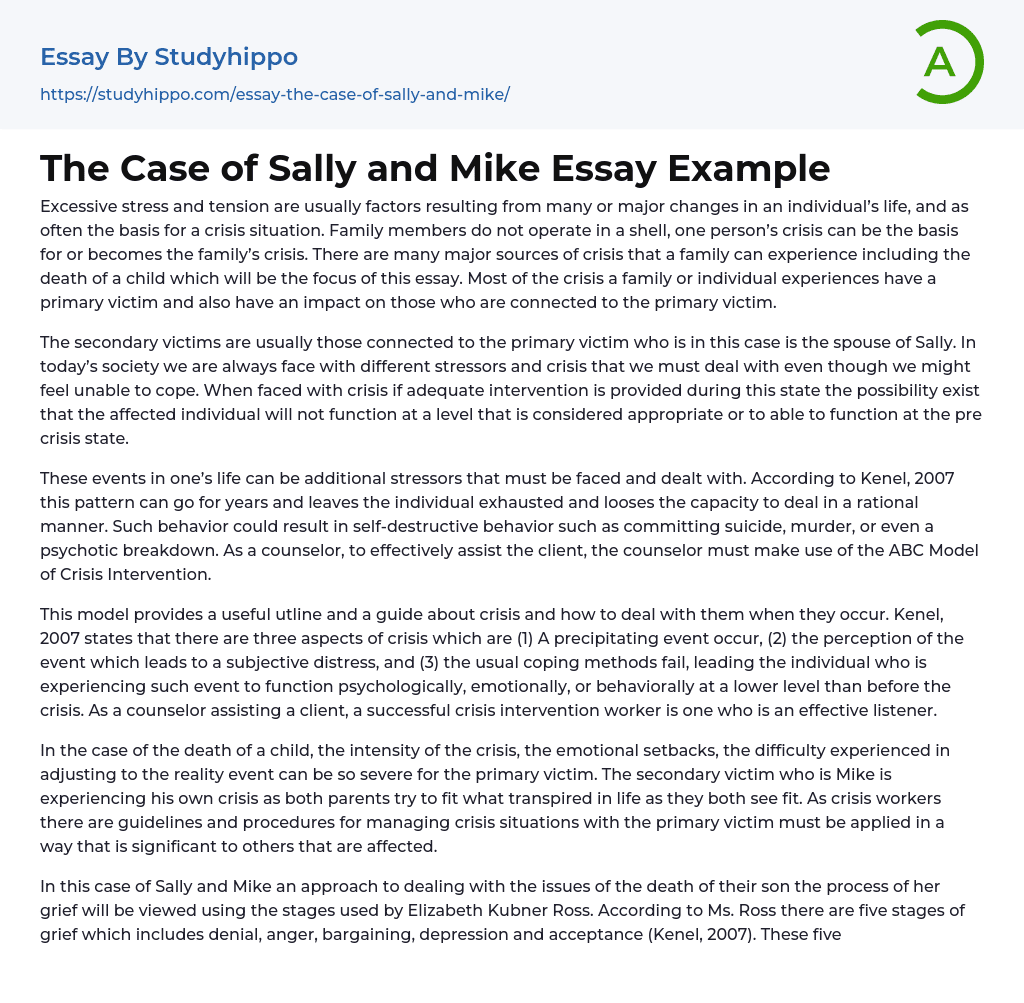Excessive stress and tension frequently occur due to significant life changes, leading to crisis situations that can impact an entire family when experienced by one member. This essay will focus on the death of a child as a central topic, highlighting it as one of the various sources of crisis encountered by families. Although most crises have a primary victim who is directly affected, individuals connected with the primary victim are also affected.
The secondary victims typically consist of individuals related to the main victim, who happens to be Sally's partner. In today's society, we often come across various stressors and emergencies that we must address, regardless of our perceived ability to handle them competently. When confronted with a crisis, offering sufficient intervention during this period enhances the chances of preventing the affected individual from functioning adequately or reverting back to th
...eir pre-crisis state.
The burden of dealing with life events can cause individuals to experience extra stress, which can lead to exhaustion and an inability to cope rationally. This, in turn, may result in self-destructive behaviors such as suicide, murder, or a psychotic breakdown. To effectively help individuals in crisis, counselors should use Kenel's (2007) suggested ABC Model of Crisis Intervention.
Kenel (2007) emphasizes the significance of this model in crisis management as it provides a valuable framework and guidance. The model includes three primary components: (1) the onset of a triggering event, (2) the emotional distress caused by the event, and (3) a decrease in an individual's functioning resulting from insufficient coping mechanisms. In order for counselors to effectively handle crises, they must possess proficient listening skills.
When a child dies, both the primary victim and Mike
the secondary victim, go through their own emotional crises in response to the situation. The primary victim faces difficulty accepting the loss while Mike also experiences his own crisis as each parent copes with it differently. As crisis workers, it is crucial for us to adhere to particular guidelines and procedures that address the impact of this crisis on others when supporting the primary victim.
Sally and Mike are going through the loss of their son, and to comprehend Sally's grieving process, we will examine it using Elizabeth Kubler Ross' proposed five stages of grief. These stages comprise denial, anger, bargaining, depression, and acceptance (Kenel, 2007). They provide a structure for dealing with and adapting to life without our loved ones, enabling us to perceive the world in a new way.
When counseling someone who is grieving, it is essential to recognize their stage in the grieving process and work together with them to enhance the effectiveness of the intervention. Implementing boundaries can offer stability, organization, and consistency. It is crucial to consider different factors that affect the impact of grief, such as the intensity of emotions experienced, the personal significance attributed to the loss, and how the individual perceives the long-term consequences stemming from this loss (Greeston and Leviton 1993 p. 5).
While Sally mourns and goes through the grieving process, it is important for us as crisis workers to allow her to openly express her guilt and other associated feelings towards the loss. We should approach her with care and without judgment, reassuring her that her emotions are normal. It is crucial to remember that everyone's grief experience is unique, including Mike's. He might be experiencing
a different reaction to the loss, potentially being stuck in the denial stage.
A crisis can bring up painful memories for anyone, forcing them to confront unresolved or previously thought resolved feelings. The toll it takes on an individual, particularly when it involves the death of a child, can be incredibly devastating. These emotional reactions can linger for years. As Ross reminds us, those experiencing grief may go through various stages, but it's important to remember that everyone's grieving process is unique.
- Child essays
- Childcare essays
- Child labor essays
- Doll essays
- Emergence essays
- Anxiety Disorder essays
- Post-traumatic Stress Disorder essays
- Insanity essays
- John Locke essays
- 9/11 essays
- A Good Teacher essays
- A Healthy Diet essays
- A Modest Proposal essays
- A&P essays
- Academic Achievement essays
- Achievement essays
- Achieving goals essays
- Admission essays
- Advantages And Disadvantages Of Internet essays
- Alcoholic drinks essays
- Ammonia essays
- Analytical essays
- Ancient Olympic Games essays
- APA essays
- Arabian Peninsula essays
- Argument essays
- Argumentative essays
- Art essays
- Atlantic Ocean essays
- Auto-ethnography essays
- Autobiography essays
- Ballad essays
- Batman essays
- Binge Eating essays
- Black Power Movement essays
- Blogger essays
- Body Mass Index essays
- Book I Want a Wife essays
- Boycott essays
- Breastfeeding essays
- Bulimia Nervosa essays
- Business essays
- Business Process essays
- Canterbury essays
- Carbonate essays
- Catalina de Erauso essays
- Cause and Effect essays
- Cesar Chavez essays
- Character Analysis essays
- Chemical Compound essays




